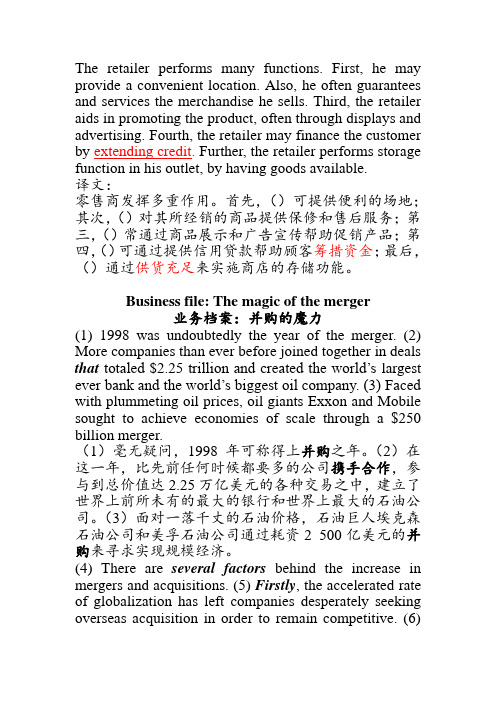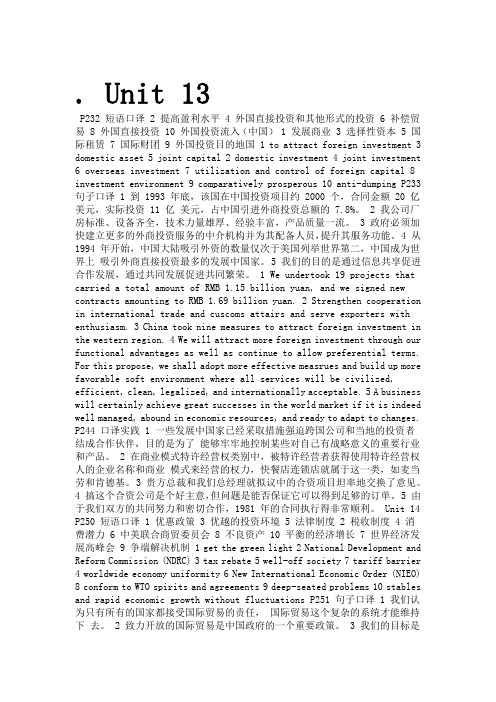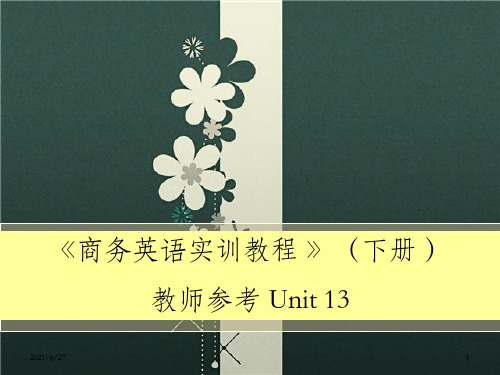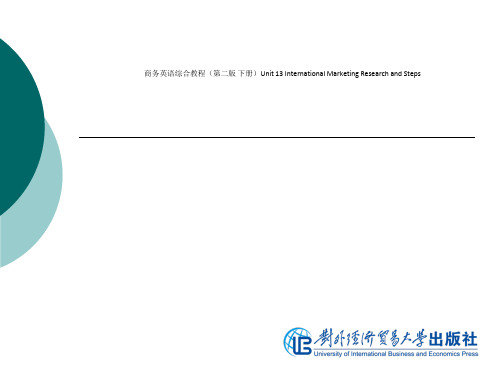商务英语翻译Unit13解答
商务英语教程答案Key to Unit 13

Key to Unit 13 Advertising StrategyLead-in1.滴滴香浓,意犹未尽。
(麦斯威尔咖啡)2.只溶在口,不溶在手。
(M&M巧克力)3.天长地久。
(斯沃奇手表)4.理解就是沟通。
(爱立信)5.成功之路,从头开始。
(飘柔)6.饮可口可乐,万事如意。
(可口可乐)7.科技以人为本。
(诺基亚)8.钻石恒久远,一颗永流传。
(第比尔斯)9.蚊子杀杀杀。
(雷达牌驱虫剂)10.分享此刻,分享生命。
(柯达胶卷)Reading 11. T2. F3. F 4 T 5 FReading 21.T2. T3. F4. F 5 . TPractical ExercisesSection 1I.1. of on at2. with by of In such as3. without at for in ofII.1. 广告客户2. 广告公司3. 广告攻势4. 买方市场5. 广告订单6. 商业广告7. 赠品广告8. 媒体计划9. 媒体空间10.可见机会11.可能的客户/潜在的客户12.盛誉13.销售收入14.赞助15.目标市场16. 品牌偏好17. 国内市场18.口头广告III.1.A2.B3.C4.B5.D6.A7.C8.D9.B 10.AIV.1.budget millions of dollars per year for advertising.2.advertisements placed in newspapers and magazines.3.particularly suitable for small businesses with limited advertising budgets.4.deliver promotional messages to targeted customers.5.that target young, well-educated customers.rm them about a company’s products or services.7.Businesses of all sizes should establish an online presence.8.Placing advertisements online.9.connects a product or service with interested consumers.10.is expected to show a 38 percent increase by 2019.V.1.网络广告是现代广告投放商认为最有效的宣传方式之一。
商务英语口语:Unit 13 Packing

商务英语口语:Unit 13 PackingPacking包装Brief Introduction包装包括运输包装(外包装或大包装)和销售包装(内包装或小包装)。
这些都是为了保护商品的品质完好和数量完整而采取的措施。
具体来说,运输包装不但要起到能防止货物运输途中受损的作用,同时也应具备装卸方便、贮存和防盗的功能。
在国际贸易中,还有一种中性包装,它是在商品包装上既不注明生产国别、地名和厂名,也不注明原有商标和牌号的包装。
Basic Expressions. These goods are very expensive, and easily damaged.这批货很贵又容易被损坏。
2. Last time you told me that you wanted the most economical packaging.上次你跟我说要最经济的包装。
3. We always take extra care with every shipment.每批货我们都会特别小心的。
4. As this articlefragile, please case it into durable packaging.这种物品易碎,请以耐用包装来装箱。
5. The cost of this article includes packaging.这种物品的价格已包含了包装费。
6. As a rule, the buyer oughtbear the charges of packaging.通常,包装费用应由买方负担。
7. The outer packing should be strong enough for transportation.外包装应坚固,适合于运输。
8. Asthe inner packaging, it must be attractive and helpfulthe sales.至于内包装,必须具有吸引力,有利于促销。
商务英语阅读(第二版)王关富unit13privateequity课后答案

Unit 13The Business of Making MoneyExercises1. Questions on the text:1)What are the latest developments in private equity in recent yearsCompared to the 1980s, the targets of today’s private equity groups are much bigger in size. In recent years, the private equity industry has raised record money and its share of mergers and acquisitions has grown massively. The industry has also become a byword for money-making skills but its wealth has also brought many enemies.2)According to the article, what are the main inconveniences for a company to bea publicly quoted companyThe main inconveniences for a publicly quoted company include: its executives have to face intrusive media coverage; it has to obey strict and long corporate-governance codes; it also has to face the threats of activist investors and short sellers and the scrutiny by some politicians.3)What are the main reasons for a company to get listed on a stockmarketTraditionally there are three main reasons to get a company’s share listed on a stockmarket. The first is to raise capital, either to expand the business or to allow the founders to realise their wealth. The second is to help retain staff, who can be offered share options as an incentive to stay and work hard. The third involves prestige; customers, suppliers and potential employees may be reassured (and attracted) by the apparent seal of approval given by a public listing. Meanwhile, being publicly listed gives a company better access to fund investors and retail investors.4)Why are companies in the Anglo-Saxon economies reluctant to borrow frombanksCompanies in the Anglo-Saxon economies were reluctant to borrow from banks because their often felt nervous about the possibility of the sudden withdrawal of credit from the banks, due to a change in lending policy, new management or an economic downturn.5)According to the article, what are the main sources for today’s companies toraise money (including equity capital and debt)Nowadays the main sources for companies to raise money are: first, equity market; second, banks, though much less important than they used to be; third, bond market; fourth, private equity.6)How do private-equity firms respond to the problems identified by ProfessorJensen with regard to public companiesProfessor Jensen argued that the structure of a public company creates an inherent conflict between investors and the managers they hire to run the business, particularly with regard to the use of free cash flow. He also arguedthat borrowing imposed discipline on executives. Private-equity firms have applied his argument in practice by gearing up the balance sheets of companies they buy with more debt than public firms are willing to accept. Though private equity firms, in the process, often have a bad reputation for relentlessly cutting unprofitable operations and shedding jobs, academic studies suggest that they create jobs rather than destroy them.7)What are the similarities and differences between today’s private-equity firmsand the conglomerates of the 1970s and 1980sSimilarities between today’s private-equity firms and the conglomerates of the 1970s and 1980s are: first, both of them use their financial power to construct diverse industrial empires; second, both claim that they could improve the companies they owned through superior management. The differences are: first, the conglomerates used highly rated shares to buy companies while private-equity firms use borrowed money; second, the conglomerates used to make ever-bigger acquisitions continuously to expand while private-equity firms claim to sell regularly their portfolio companies or business for profit.8)What make it impossible for the private-equity model to become the norm forcompaniesThere are several reasons: first, what might be logical for an individual company might not be best for the economy overall. If all companies were to substitute debt for equity on the scale that private-equity firms have, there would be an increase in the cost of debt. That would lead to lower equity returns; second, since private-equity firms need an exit route to sell their investments, a public market will be needed in the end for someone to realise their profit; third, a bigger role for private equity might make the economy more vulnerable because in a world where most companies carried private-equity-style debt levels, companies would be much more vulnerable and recessions might become much more frequent and consequently monetary policy would become more difficult, and even government revenues might be affected.9)According to the article, what factors have helped the development ofprivate-equity firms since 2003Those factors are: low interest rates, lots of liquidity and rising asset prices10)What are the signs showing that private-equity firms may now face the peak ofthe cycleThose signs are: first, bond yields have been rising, making takeovers more expensive; second, the high level of corporate profits suggests that it could be difficult for private-equity firms to wring more money out of these companies;third, the relentless campaign against private-equity tax privileges may lead to government actions against the interests of private-equity firms; last, more and more private-equity deals often leads to more competition and thus lower returns.2. Fill in each blank of the following sentences with one of the phrases in the list given below:1)The journey usually takes six weeks but you should allow for delays caused bybad weather.2) A popular bicycle rental scheme in Paris that has transformed travel in the cityhas run into problems just 18 months after its successful launch.3)China’s import as a proportion of total trade has substantially increased inrecent years as it’s been pursuing a more balanced trade.4) A growing pile of evidence shows that skimping on sleep promotes weight gain.5)Such a move would put the bank in danger of going bust.6)We have turned down four applicants already.7)When you're cooking, you should keep all the ingredients close at hand.8)She wrote to him in the belief that he would help her.9)Dr. Cong will continue to lead the company as its CEO and hold a stake in it forthree years.10)A lot of questions were being asked at the conference today and surprisingly theofficials answered them in spades.11)In the absence of outside leadership, we have created these guidelines in orderto respond timely and effectively.12)With the joining of South Africa, the Bric club of influential emerging economiesis now in pursuit of a common market among them.3. Match the terms in column A with the explanations in column B:A B1) corporate governance a) An investor who attempts to force a corporation tomake changes in management, board structure,investment policies, use of retained earnings, orother practices, often by introducing shareholderproposals or putting forward alternative directors.62) bridge financing b) An interest group that endeavors to influencepublic policy and especially governmentallegislation, regarding its particular concerns andpriorities. 83) trade union c) A privilege, sold by one party to another, thatgives the buyer the right, but not the obligation, tobuy or sell a stock at an agreed-upon price withinacertain period or on a specific date. 104) stakeholder d) A method of financing, used by companies beforetheir IPO, to obtain necessary cash for themaintenance of operations. 25) short seller e) The set of processes, customs, policies, laws, andinstitutions affecting the way a corporation (orcompany) is directed, administered or controlled.16) activist investor f) A n organization of workers that have bandedtogether to achieve common goals such as higherwages or better working conditions. 37) venture capital g) The process of buying an undervalued companywith the intent to sell off its assets for a profit. 9 8) pressure group h) An investor who sells a commodity, currency, orsecurity which he or she does not own at the timeof sale. 59) asset stripping i) Money provided by investors to startup firms andsmall businesses with perceived long-term growthpotential. 710) stock option j) Person, group, or organization that has direct orindirect stake in an organization because it canaffect or be affected by the organization's actions,objectives, and policies. 44.Translate the following into Chinese:出于几个原因,上市的前景对私募股权投资公司而言具有相当的吸引力。
商英 unit 13 cultures 答案

Unit 13 CulturesPart I Business V ocabulary1 Please make sure that our order will be executed to the entire __A___ of ourcustomers.A satisfactionB satisfactoryC satisfying C satisfied2 The goods _____A_____ if your L/C had arrived by the end of this month.A would have been shippedB would be shippedC will be shippedD should have been shipped3 Unless otherwise _____B_____, we wish to arrange to take out insurance on theshipment against All Risks and War Risk.A instructingB instructedC to instructD instructs4Please tell us ______A______ the goods will be transshipped.A whereB whatC whichD who5Please ____B_____ us how the goods are packed.A adviceB adviseC noticeD note6Our customers request you ___B_____ what you mean by “prompt shipment”.A explainB to explainC explainingD explained7_____B____ the end of March, we had shipped 2,000 tons of rice to London.A InB ByC atD from8Shipment will be ______D______ in May 2007.A leftB startedC set outD effected9Goods will be shipped within one month after ____C_____ of your order.A receivingB receptionC receiptD received10It is imperative that all your future credits should allow transshipment and _____A____ shipment.A partialB partlyC in partD parted11Shipment is to be made during March to May ____A_____ three equal lots.A inB atC byD on12Direct steamers to your port are few _____C______ winter season.A atB onC duringD by13Please try your best to ship our order _____D______ that steamer.A forB inC withD by14We find ____C_____ transshipment of your order is not possible.A whenB whatC thatD how15 For your order, we have _____A______ space on S.S. “Mermaid” due to arrive atHong Kong around May 28.A hiredB boughtC firedD purchased16Since the transaction is made ____C____ FOB basis, you are to ship the goods bya steamer to be designated by us.A atB byC onD in17 In our letter of May 5, we made ___D____ clear that shipment is to be effected inJune.A youB themC thatD it18 Please make efforts to get the goods ___C____ immediately.A to dispatchB dispatchingC dispatchedD dispatch19 We have shipped your order on board M/V, which sails __B__ your port tomorrow.A atB forC toD from20 After inspection, we found nine cases _______A_______.A damagedB to damageC damagingD damagePart II Phrase Translation1 企业文化company culture2 社会习俗social customs3 历史事件historical events4 文化意识cultural awareness5 全球商务global business6 欧盟European Union7 发达形象developed image8 英美文化Anglo-American culture9 出口业务export business10 创新设计original design11 原产国country of origin12 个人接触personal contact13 玩具生产公司toy manufacturing firm14 仓库经理Warehouse Manager15 公关部经理Public Relations Manager16 行政员工administrative staff17 文化冲击culture shock18 闲谈small talk19 贸易集团trading group20 名片business cardPart III 英译中1.This country is sensitive to how it presents itself to the outside world.这个国家对怎样向外界展示自己的形象非常敏感。
商务英语口译 Unit 13 Sales And Marketing

• The Canton Fair, with the 106th session coming up from October 15th to November 4th in Guangzhou, is China’s flagship international trade show with the longest history, the largest scale, the most complete offerings of commodities, the highest turnout of participants, and the most fruitful results. For this session, the sponsors are assembling more than 20,000 enterprises with 150,000 varieties of exhibits and are expected to attract approximately 200,000 overseas buyers. We cordially invite buyers from the US to source at the Canton Fair, and look forward to the display of US products which meet the needs of the Chinese market. I am sure that US
• Marketing is used to identify the customer, to satisfy the customer, and to keep the customer. With the customer as the focus of its activities, it can be concluded that marketing management is one of the major components of business management.
大学核心商务英语口译教程各单元的答案详解Unit13-40页PPT文档资料

第三部分 课文详解-4
• My beloved motherland is a country that values her traditions while opening her arms to the outside world. The traditional Chinese culture is rich, extensive and profound. Harmony, the supreme value cherished in ancient China, lies at the heart of the Chinese culture. The Book of History, an ancient classic in China for example, advocates amity among people and friendly exchanges among nations.
第三部分 课文详解-2
• My beloved motherland is a country that stood numerous vicissitudes but never gave up. Earlier in my career, I worked in northwest China for many years. There, in the boundless desert, grows a rare variety of tree called euphrates poplar. Rooted over 50 meters down the ground, they thrive in hostile environments, defying droughts, sandstorms and salinization. They are known as the “hero tree”, because a euphrates poplar can live for a thousand years. Even after it dies, it stands upright for a thousand years, and even after it falls, it stays intact for another thousand years. I like euphrates poplar because they symbolize the resilience of the Chinese nation.
商务英语翻译Unit 13 保险

Insurance
CONTENTS
Teaching Aims Passage One
Passage Two
Drills
TEACHING AIMS
After studying this unit, you are required to:
1. Have a sound understanding about the insurance. 2. Translate the professional language of the insurance. 3. Get hold of the translating methods and skills of some sentences and paragraphs relating the insurance. 4. Master the difficult words and expressions.
recent years that gap has been narrowing obviously.(
F
)
Passage One Reading Comprehension
4. The average family will have $70000 for life insurance and most people do not have enough life insurance . ( ) T 5. Life insurance or health insurance is based on sharing the risk with healthy people. ( ) T
2. If people are living longer and longer, in contrast, their insurance F payment term will become shorter and shorter. ( ) 3. Women in the United States generally live longer than men. But in
商务英语翻译Unit13

70%
An effective macro policy implemented by the government to drive the national economy out of deflation is a prerequisite for the disposal of bad loans and the recovery of sound bank management.
使用合译法的三种情况:
2)将原文中的并列句合译成一个单句或复句,
如:
We appreciate theDgAoTEo1d quality of your shoes,but 60%
unfortunately your prices appear to be on the high
side even for shoesDAoTfE2this quality.
关于债权购买,DAT运E2 营计划中规定了一项85% 要求,即认可企DAT业E3 的盈利能力与技术、70% 品牌和人力资源方面的光明前景。
使用合译法的三种情况:
1)原文中两个或两个以上句子表述焦点或
话题同一,如: An offer is a promDAisTEe1 to supply goods on the 60% taenrdmascacnepdtceodnbdeitfDiooArTneE2sastcaotnetdr.aIcttmcaunstebxeistm. ade85% 发盘就是按照所D述ATE条3 件发货的一种承诺,需70% 在订立合同前提出或接受。
"China has been the most important trade partner for Germany from 2016 to 2020. For the BMW Group, China has become our largest single market."
商务翻译(英译汉)Unit 13 Flexible Work Time Brings

• 【参考译文】人们常说过,科学家以归纳法和演 绎法工作,借助于这些方法,在某种意义上说,设法 从自然界找出某些自然规律,然后根据这些规律,用 他们自己特殊的技能逐步建立起自己的理论。
Unit 13
Flexible Work Time Brings
《商务英语翻译》 (英译汉)
【Translation】
• Job flexibility is the key to keeping workers happy, productive and loyal to the company, a new study shows. Researchers at Wake Forest University School of Medicine in Winston-Salem, North Carolina, found that workers who enjoyed more work flexibility were also less likely to say health problems affected their performance at work.
• 【参考译文】遗憾的是,在过去我们已经从总目标 的一致发展到在目标上的分歧,并且从有所作为到 无所作为。
• 6. Just as all truck drivers and construction workers are no longer necessarily men, all secretaries and receptionists are no longer automatically women. • 【结构分析】这里句子结构实际上是Just as...., so.....,译为“正如……,……也一样”。从上述我们 可以看出,翻译中的关键在于缩小两种语言的结构上 的差距,如果能将差距缩小到最小限度,那么翻译就 小,这本身就证明了这点。
商务英语翻译(英译汉)第二版电子教案第13单元译文

The retailer performs many functions. First, he may provide a convenient location. Also, he often guaranteesand services the merchandise he sells. Third, the retaileraids in promoting the product, often through displays and advertising. Fourth, the retailer may finance the customerby extending credit. Further, the retailer performs storagefunction in his outlet, by having goods available.译文:零售商发挥多重作用。
首先,()可提供便利的场地;其次,()对其所经销的商品提供保修和售后服务;第三,()常通过商品展示和广告宣传帮助促销产品;第四,()可通过提供信用贷款帮助顾客筹措资金;最后,()通过供货充足来实施商店的存储功能。
Business file: The magic of the merger业务档案:并购的魔力(1) 1998 was undoubtedly the year of the merger. (2)More companies than ever before joined together in dealsthat totaled $2.25 trillion and created the world’s largest ever bank and the world’s biggest oil company. (3) Facedwith plummeting oil prices, oil giants Exxon and Mobilesought to achieve economies of scale through a $250 billion merger.(1)毫无疑问,1998年可称得上并购之年。
商务英语实训教程上册上册 unit 13 Sales Processes 教师参考

可以松缓身体的紧张。 14. trainee [ˌtreiˈniː] 例句1:Tom didn‘t know the trainee beside him.汤姆并不认识他旁边 的那个实习生。 例句2:Each trainee according to the own work, supposes to make a Strategic Sales Plan. 每位学员根据自己的工作制定销售战略 计划。
Business Terms
1.after-sale follow-up 售后跟踪服务 售后跟踪服务是市场营销领域的专业术语。是指生产企业、 经销商把产品(或服务)销售给消费者之后,为消费者 提供的一系列服务,包括送货、安装、调试、维修、技 术培训、上门服务以及后续服务等等。 2.perceived value 感知价值 感知价值是指与其他竞争产品相比,顾客对拥有或使用某
例句2:In the light of his remarks, we rejected her offer. 鉴 于她的评语,我们拒绝了她的提议。
3. be associated with 例句1:I didn‘t want to be associated with it at all. 我根本不 想与这事有牵连。 例句2:Her name will ever be associated with the women's lib. 她的名字将永远和女权运动联系在一起。
商务现场口译答案Unit 13

. Unit 13P232 短语口译 2 提高盈利水平 4 外国直接投资和其他形式的投资 6 补偿贸易 8 外国直接投资 10 外国投资流入(中国) 1 发展商业 3 选择性资本 5 国际租赁 7 国际财团 9 外国投资目的地国 1 to attract foreign investment 3 domestic asset 5 joint capital 2 domestic investment 4 joint investment 6 overseas investment 7 utilization and control of foreign capital 8 investment environment 9 comparatively prosperous 10 anti-dumping P233 句子口译 1 到 1993 年底,该国在中国投资项目约 2000 个,合同金额 20 亿美元,实际投资 11 亿美元,占中国引进外商投资总额的 7.8%。
2 我公司厂房标准、设备齐全,技术力量雄厚、经验丰富,产品质量一流。
3 政府必须加快建立更多的外商投资服务的中介机构并为其配备人员,提升其服务功能。
4 从1994 年开始,中国大陆吸引外资的数量仅次于美国列举世界第二,中国成为世界上吸引外商直接投资最多的发展中国家。
5 我们的目的是通过信息共享促进合作发展,通过共同发展促进共同繁荣。
1 We undertook 19 projects that carried a total amount of RMB 1.15 billion yuan, and we signed new contracts amounting to RMB 1.69 billion yuan. 2 Strengthen cooperation in international trade and cuscoms attairs and serve exporters with enthusiasm. 3 China took nine measures to attract foreign investment in the western region. 4 We will attract more foreign investment through our functional advantages as well as continue to allow preferential terms. For this propose, we shall adopt more effective measrues and build up more favorable soft environment where all services will be civilized, efficient, clean, legalized, and internationally acceptable. 5 A business will certainly achieve great successes in the world market if it is indeed well managed, abound in economic resources, and ready to adapt to changes. P244 口译实践 1 一些发展中国家已经采取措施强迫跨国公司和当地的投资者结成合作伙伴,目的是为了能够牢牢地控制某些对自己有战略意义的重要行业和产品。
商务翻译(汉译英) Unit 13 疯狂还是无奈?_OK

11
下午,我到图书馆,借出一本书。然后,回家吃饭。吃饭后, 我把书打开,我十分烦恼,原来这本书不是我要借的书。我就是 这号人:拿出一本书不看就走。我不能怪别人,只能怪自己。
9
昨奉大函,诵悉一是。尊稿极佳,唯篇幅 甚长,本志地位有限,故不克刊登,良用歉 然。
I received your letter yesterday. Your article is very good, but I am sorry that owing to pressure of space, I find it too long to be published.
5
英语和汉语这两种语言在语法衔接方面的 差异主要体现为,英语的语法衔接具有明显的 特征,而汉语的语法衔接则接近于隐性。英语 的显性衔接主要借助于形态变化和形式词,明 显地标明词之间、词语之间、短语之间或小句 之间的语法关系。而汉语在构建句子时,更加 关注的是隐性衔接,以意统形,少用甚至不用 形式手段,靠词语与句子本身意义上的连贯与 逻辑顺序实现衔接。虽然两种语言在语法衔接 手段上,都用语法手段,但各自所采用的具体 方式却有不同。
译二:What’s the teacher's image? On Teacher's Day, Sept.10, a group of teenage reporters from the middle school attached to Qinghua University took a poll on the street on seventy six passersby. Eighty six of those surveyed said that teachers should be held in high esteem because they are committed to the shaping of the younger generation, an undertaking crucial to achieving a higher level of education in China.
商务英语实训教程下册 Unit 13 Corporate Meeting教师参考_OK

2021/6/27
11
11. merger [mə:dʒə]
例句1:I interviewed you in Shenzhen about the enterprise merger. 我曾在深圳就企业兼并的事采 访过您。
2021/6/27
2
【文本翻译】
公司会议
每一家公司每年都要召开股东大会来进行
董事的更换选举。一年当中, 公司还要召开其他
会议来征得股东们对公司某项提议措施的同意,
比如公司股本是否增减、公司章程是否修订或
者公司是否合并等。年度股东大会有具体的法
定要求,必须发布会议通知。在发布正式通知
的同时应当配发代理人的投票表格、回信地址
例句1:This conference in Cairo capped weeks of negotiations between the two parties. 这次开罗会议 圆满结束了双方几周以来的谈判。
例句2: The conference will now rise for dinner.
2021/6/27
5
在邀请函打印之前,必须复核其中的信息。 确认邀请函上的具体时间、地点以及发言 人的名称。没有人会因为邀请函上信息的 疏漏而愿意打电话向会议主办方咨询。
2021/6/27
6
New Words 词汇教学重点: 1.amendment [ə'mendmənt]
例句1:The amendment was rejected by 207 voters to 143. 这项修正案以207票对143票被否决。
商务英语综合教程(第二版 下册)Unit 13 International Marketing Re

marketing strategies: 营销策略
Notes
2. International marketing research is necessary in order to decide which foreign markets to enter and the best mode of entry (exporting, licensing, joint ventures, etc.) to each nation. exporting, licensing, joint venture: 出口、许可证以及合资经营,这 些都是进入国际市场的方式。其他进入的方式还包括:使用代理 或分销商、建立国外分支机构或子公司、设立独资企业等 。
4.There is nothing direct to show that he is guilty of the crime. So far all the evidence is only _______.
Exercises
5.It was very _______ of you to tell her about your pay raise when she has been unemployed since last year.
according to refer to take sth. into consideration regard sb./sth. as rather than tend to do bid conversely artificial restore
1.But________, music may also distract or annoy some workers.
- 1、下载文档前请自行甄别文档内容的完整性,平台不提供额外的编辑、内容补充、找答案等附加服务。
- 2、"仅部分预览"的文档,不可在线预览部分如存在完整性等问题,可反馈申请退款(可完整预览的文档不适用该条件!)。
- 3、如文档侵犯您的权益,请联系客服反馈,我们会尽快为您处理(人工客服工作时间:9:00-18:30)。
弱式短语: Give rise to (arouse) / make contact with (meet) / arrive at a decision (decide) / bring to a conclusion (finish) / take into consideration (consider) / conduct an investigation into (investigate)
过分使用名词化会使语言抽象、冗长、含糊、缺乏活力。
2.用名词表示施事者,以代替动词。 He is a good eater and a good sleeper. - 他能吃能睡。
3.名次代替形容词(名词连用),构成标题式短语。 Space shuttle flight test program - 航天飞机试飞计划
• 汉语动词常常重复或重叠,可以加强汉语动态感的表现力。
说说笑笑,跑跑跳跳,孩子们十分愉快。 - Talking and laughing, running and jumping, the children had a
good time.)
英汉互译过程是静态和动态相互转换的过程。
Ford’s first pledge was, “Mr. President, you have my support and my loyalty.” - 福特一开始就保证说:“总统先生,我支持您,并效忠于您。”(静-动)
静态与动态
英语倾向于多用名词,因而叙述呈静态;汉语倾向多用动词,因而叙述呈 动态。 英语静态倾向表现为:
1.名词化(Nominalization): 使表达比较简洁,造句比较灵活,行文比较自 然,也便于表达较为复杂的思想内容。 The doctor arrived extremely quickly and examined the patient uncommonly carefully; the result was that he recovered very speedily. The doctor’s extremely quick arrival and uncommonly careful examination of the patient brought about his very speedy recovery. - 医生迅速到达,并非常仔细地检查了病人,一次病人很快就康复了。
you with your accounts.
• 汉语中动词可以充当句子的各种成分。
实现理想要靠辛勤劳动。(主、宾) - To translate ideals into reality needs hard work. 革命不是请客吃饭。(表) - Revolution is not a dinner party.
繁复与简短
•
从属结构是现代英语最重要的特点之一。现代英语中包孕
式复合句很常见。专业作者写的句子平均长度为20个词。受
过教育的人写的句子平均长度为25个词。总的来看英语句子
比汉语句子长很多。
• 汉语常用散句、松句、紧缩句、省略句、流水句或并列形式 的复句,以中短句居多,最佳长度为7至12字。
英译汉时要破句重组,化繁为简:
playing an unequal role in a sentence. Subordination in a complex sentence.
意合(parataxis)语言:以语义为衔接手段 ( para=beside ; taxis="arrangement) . It favors short, simple sentences, with the use of coordinating rather than subordinating conjunctions.
• 汉语倾向于多用动词。
他想办法摆脱了困境。(连动式) - He thought his way out of the dilemma. 我们请她唱歌。(兼语式) - We asked her to sing. 我去叫他们派一个会计到这儿来帮助你算帐吧。 (兼语+连动) - Let me go and ask them to send an accountant here to help
形合(Hypotaxis ):指句中的词语或分句间用语言形式手 段连接起来,表达语法意义和逻辑关系。
意合(Parataxis) :指词语或分句之间不用语言形式手段连 接,句中的语法意义和逻辑关系通过词语或分句的含义表达。
(一)英语的形合句法 1.关系词和连接词who, whom, whose, that, which, what 等,
1.语序 她不老实,我不能信任她。 Because she is not honest, I can’t trust her.
2. 反复、排比、对偶、对照等。 他不来,我不去。 If he won’t come here, I’ll not go there.
3. 紧缩句 有饭大家吃。 Let everybody share the food if there is any.
4. 四字格 不进则退 He who does not advance falls backward.
英译汉时,往往先分析句子的结构、形式,才能确定句子的 功能、意义;汉译英时要先分析句子的功能、意义,才能确定句 子的结构、形式。
(三)意合、形合与文体
一般来说英语形合多,汉语意合多,但其多少受文体的影响。书面语 形合句多,口语意合句多。
Unit 13
Flexible Work Time Brings
形合与意合(II)
形合与意合(II)
衔接手段: 句法手段、词汇手段和语义手段。
形合(hypotaxis)语言: 以句法、词法为衔接手段 (from Greek : hypo="beneath", taxis="arrangement"). constructs
5. 动词的弱化与虚化:be 动词和have, become, grow等系动词。 There was a tropical storm off the east coast of Florida. - 弗罗里达东海岸有一场热带风暴。 A tropical storm lashed the east coast of Florida. - 一场热带风暴袭击了弗罗里达东海岸。
2.介词。英语造句几乎离不开介词,汉语则常常不用或省略介词。 The many colors of a rainbow range from red on the outside to violet on the inside. - 彩虹有多种颜色,外圈红,内圈紫。
3. 其它连接手段 There is nothing more disappointing to a hostess who has gone to a lot of trouble or expense than to have her guest so interested in talking politics or business with her husband that he fails to notice the flavor of the coffee, the lightness of the cake, or the attractiveness of the house, which may be her chief interest and pride.
- 最令女主人失望的是,她花了许多心神或费用来招待客 人香喷喷的咖啡,松软的糕点,或房间内 讲究的陈设,而这些却可能是她感到有兴趣并引以自豪的 主要所在。
(二)汉语的意合法
汉语注重隐性连贯(covert coherence), 注重逻辑事理顺 序,意义,以神统形。汉语的意合法往往采用以下手段。
6.形容词或副词表达动词的意义。 I am doubtful whether he is still alive. - 我怀疑他是否还活着。 Down with the old and up with the new. - 破旧立新。
总之英语常通过动词的派生、转化、弱化、和虚化等手 段,采用非动词的形式(名、介、形、副)表达动词的意 义,因而呈静态。
他深信,只有对历史透彻研究,才能真正学到知识。 - He is in the full conviction that real knowledge is the end product of a thorough study of the history.
总之,英语重形合,注重形式接应(formal cohesion),结构 完整,严密规范,是焦点句法;汉语重意合,重意念连贯 (semantic coherence),句子以意统法,流泻铺排,是散点句法。 王力:“就结构而言,西洋句法是法治的,中国语言是人治的。”英 语有综合特征,受形态的约束,因而“语法是硬的,没有弹性”;汉 语是分析语,不受形态的约束,因而“语法是软的,富于弹性。”
英语常用非人称主语,汉语常用人称主语。
What has happened to you? - 你出什么事啦? An idea suddenly struck me. - 我突然想到了一个好主意。 It never occurred to me that she was so dishonest. - 我从来也没有想到她这么不老实。
汉语几乎不用。
All was cleared up some time later when news came from a distant place that an earthquake was felt the very day the little copper ball fell. - 过了一些时候,从远方传来了消息:在小铜球坠落的当天,确 实发生了地震。这一切终于得到了澄清。
